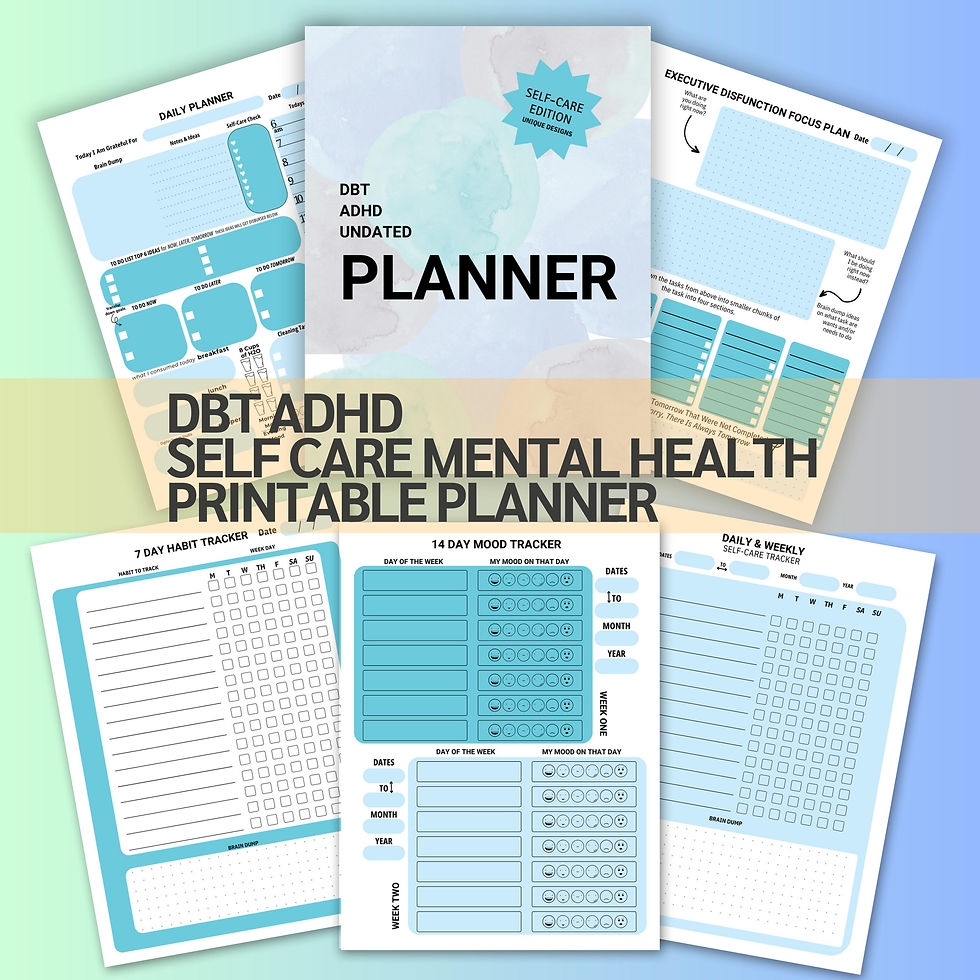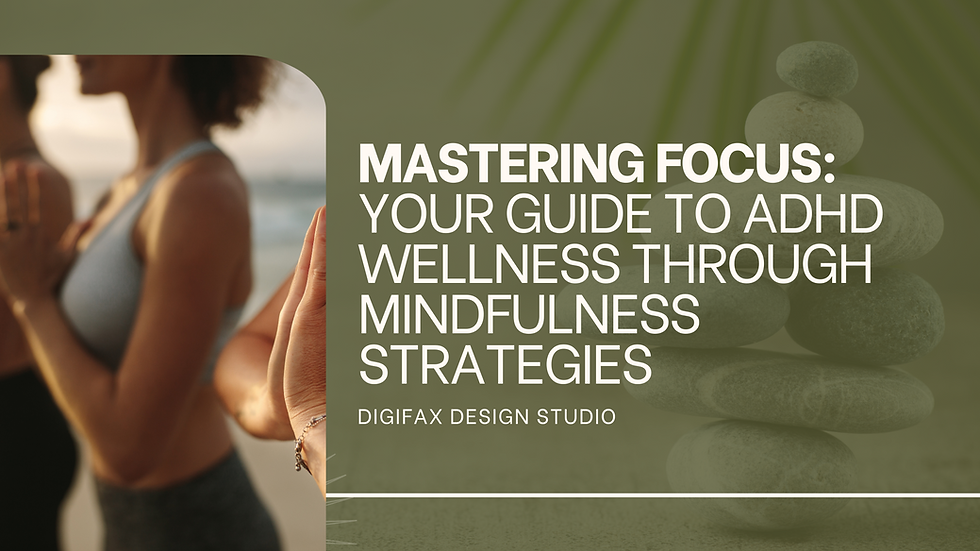Unlocking Joy: Pet Therapy Benefits for ADHD on National Love Your Pet Day
- Megan Brewer
- Feb 20, 2024
- 4 min read
Pets and Mental Health: A Guide for ADHD Individuals

In the hustle and bustle of our daily lives, finding moments to of joy and tranquility can be challenging, especially for individuals grappling with Attention Deficit Hyperactivity Disorder (ADHD). However, there's a furry, four-legged solution that goes beyond companionship – pet therapy. As we celebrate National Love Your Pet Day, let's delve into the profound benefits of pet therapy for individual's navigating the challenges of everyday life living with ADHD. I know first hand how impactful having a pet increases the dopamine I am always searching for, my Black Labrador Retriever loves to give hugs and I love them back!

The moments I experience between me and my dog can always bring me back to my center, I encourage everyone struggling with isolation, depression among several other mental health disorders to participate in a form of Pet Therapy if possible.
Before we explore the positive impact of pet therapy, it's essential to understand the intricacies of ADHD. Attention Deficit Hyperactivity Disorder is a neurodevelopmental condition characterized by difficulties in sustaining attention, impulsivity, and hyperactivity. Individuals with ADHD often face challenges in various aspects of life, including academics, work, and interpersonal relationships. Always remember to be patient with each other, we are all just trying our best!
Tip #1 - Companionship as a Coping Mechanism
Living with ADHD can be isolating and challenging, but having a companionship like a pet can provide you with a constant source of comfort and joy. Whether it's a loyal dog or a friendly cat, the presence of a non-judgmental companion creates a safe space for individuals with ADHD to express themselves without fear of criticism or mistrust.
Tip #2 - Routine and Responsibility
One of the core challenges for those with ADHD is maintaining a consistent routine. Pets, especially dogs, thrive on routine. Implementing daily habit trackers, daily task to do lists or daily planners is an asset many individuals struggling with ADHD and hyper focusing on the task you shouldn’t be focusing on. The daily tasks of feeding, walking, and grooming instill a sense of responsibility and structure, helping individuals with ADHD develop and adhere to a more organized lifestyle. If I forget to note “Take Shadow for a walk” in my daily planner, I forget. However, because dogs strive on routine, my dog reminds me every morning he is ready for his walk.
Tip #3 - Calming the Chaos: The Therapeutic Effect
The sensory stimulation provided by interacting with pets has shown remarkable therapeutic effects for individuals with ADHD. The act of petting a cat or playing with a dog releases endorphins, the body's natural mood enhancers, promoting a sense of calmness and focus. When your capacity is feeling depleted, simply by taking a moment to stop and pet an animal, increases your dopamine level. Dogs can certainly feel your emotions and energy, anytime I am having a moment or am feeling emotional, my dog always know to come snuggle against me. It works!
Tip #4 - Choosing the Right Pet for You
One thing to note, is the fact - Not all pets are created equal when it comes to assisting individuals with ADHD. While dogs and cats are popular choices, the key is finding a pet that matches the individual's personality and lifestyle is the key focus. Fish tanks, for instance, can provide a soothing visual stimulus and provide a calming relaxing affect on individuals.
Tip #5 - Training and Certifying Therapy Animals - Always Conduct Your Research
For any individuals seeking as well as considering pet therapy as a source of formal intervention, it is crucial to conduct research by exploring training and certifying a pet as a therapy animal. Organizations such as Companion Paws in British Columbia, Canada and Therapy Dogs International in the New Jersey, United States, both offer resources and guidance on the process, ensuring a seamless integration of the therapy animal into daily life.
The Scientific Backing: Pet Therapy and ADHD
There has been numerous studies in which support the idea that pet therapy can significantly improve the symptoms of ADHD. A study published in the NCBI National Center for Biotechnology Information (Gee, Nancy R. et al, 2021), found that children with ADHD who interacted with dogs experienced a reduction in executive functioning, hyperactivity and improved attention spans.
Research has also highlighted the value of dogs for children with disorders of executive functioning and self-regulation, especially autism spectrum disorder (ASD) and attention-deficit/hyperactivity disorder (ADHD).
Here are Some Fun Helpful Ideas to Help You Commence National Love Your Pet Day.
Give your pet an extra special treat today.
Take your pet on a longer walk than usual.
Practice learning new tricks together.
Clean their bed and wash their bedding as well as their favorite toys.
Whatever you decide to do, spoil, and appreciate your pets! Make sure to use the hashtag #NationalLoveYourPetDay to post on your social media accounts.

As we celebrate National Love Your Pet Day, let's go beyond the usual gestures of affection. Consider exploring the realm of pet therapy for yourself or a loved one dealing with ADHD. The benefits extend beyond the immediate joy of companionship, providing a holistic approach for mindfulness.
Furthermore, ADHD wellness is an ongoing process, and the journey is never linear and patience is as crucial part of the destination. Embrace mindfulness into you life as your ally, unlocking a path towards a more centered and fulfilling life before you know it.
In conclusion, mindfulness in motion emerges as a beacon of hope for those navigating the complexities of ADHD. By incorporating mindful breathing, sensory awareness, and purposeful movement into your daily routine, you pave the way for enhanced focus and overall well-being.
Oh, and... please share your pet pictures with us, we would love to see them!
As Well, Please MAKE SURE to hit that SUBSCRIBE button to join our E-MAIL List to stay up to date on new products, updates and blog posts!
- Megan DDS
Resources
Gee, Nancy r., Rodriguez, Kerri E., Fine, Aubrey H., Trammel, Janet P., National Library of Medic. (2021). Dogs Supporting Human Health and Well-Being: A Biopsychosocial Approach - PMC. NCBI National Center for Biotechnology Information. https://ncbi.nlm.nih.gov/pmc/articles/PMC8042315/.




Comments